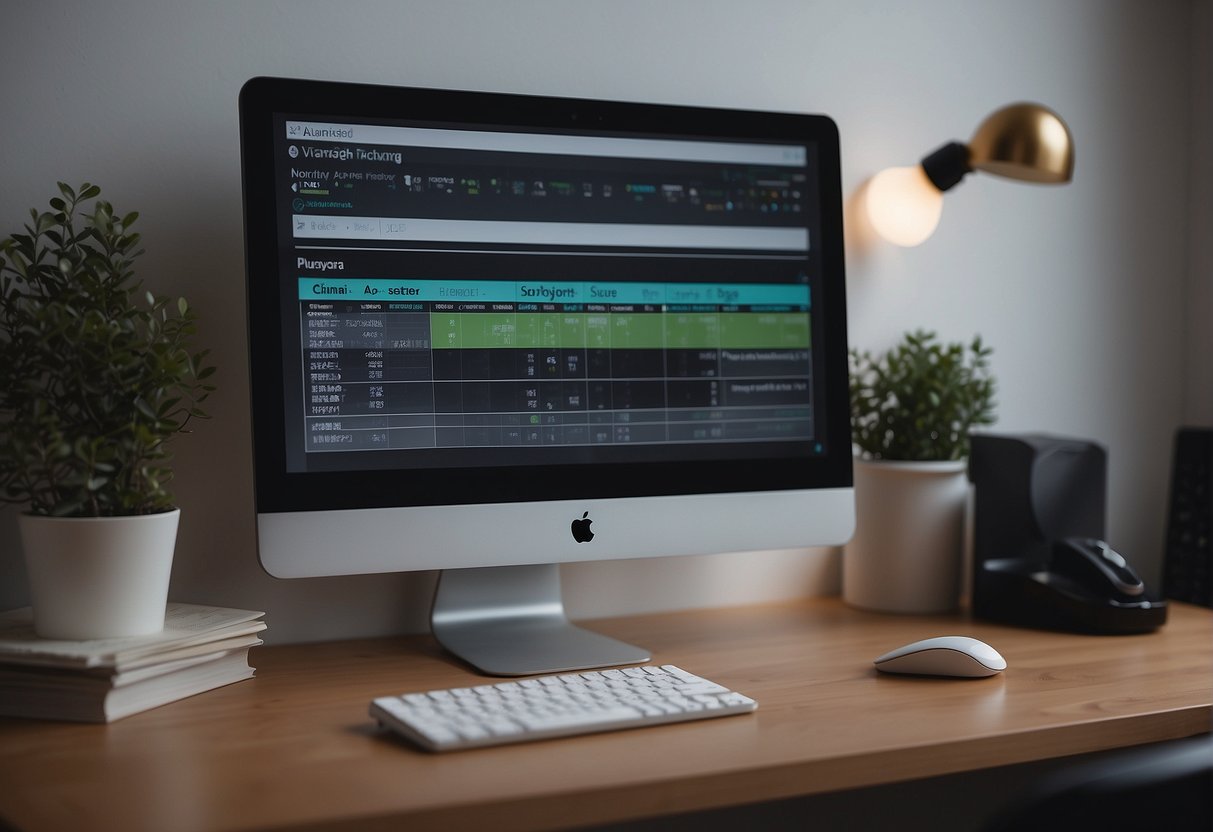Best Time Tracking Software for Small Businesses: Our Top Picks for Efficiency
Understanding Time Tracking Software
When you’re running a small business, keeping track of time isn’t just about logging hours. It’s about understanding where your team’s efforts are going—and how you can boost productivity. That’s where time tracking software comes in.
Think of it like a fitness tracker for your workday. These apps give you insights into how your team spends its time. You’ll often find features like timesheets, which everyone loves to fill out, right? But really, they’re made painless with one-click timers and intuitive interfaces that time tracking apps offer.
Time tracking works by allowing you to start and stop timers as you switch between tasks, or log hours manually if that’s more your speed. Plus, many time tracking apps can be integrated directly into project management tools, letting you see the big picture—how each minute aligns with project deadlines and budgets.
Here’s a quick look at why you might need these tools:
- Timesheets: Automatically generated, bye-bye manual entry
- Reporting: Get the lowdown on time allocation
- Productivity Insights: Discover time-drains and peak work hours
And hey, if you’re worried about a “Big Brother” vibe, most apps are anything but Orwellian. They’re designed to empower you and your team to make better-informed decisions about time management without feeling like someone’s watching every click.
So, grab yourself a time tracking sidekick and start understanding your business’s time better. Who knows, you might find more hours in the day than you thought you had!
Key Features of Time Tracking Tools

When it comes to keeping tabs on hours for billing or productivity, the best time tracking tools for small business pack a punch with several must-have features. Here’s a breakdown of the essentials you should look out for.
User-Friendly Interface and Experience
Your time is gold, so wrestling with a complicated system is a no-go. Look for an intuitive interface that feels natural to navigate. A clean layout means you can jump right in without scratching your head over complex menus.
Comprehensive Time Tracking Capabilities
At its core, the tool should make employee time tracking a breeze. From automatic time tracking that runs quietly in the background to manual timesheets you can fill, these features should be flexible and precise to capture every billable minute.
Project Management Integration
You want your time tracker to play nice with your project management tools. Built-in integration helps bridge time data and project progress, laying out your tasks and deadlines all in one spot.
Payroll Functionality
Cut down on the monetary maths with a tool that ties hours straight to payroll. Whether it’s simple calculations or complex rates, seamless integration ensures everyone gets paid accurately and on time.
Mobile Application Accessibility
A handy mobile app means you can keep up with the team, even when you’re out and about. Whether on iOS or Android, the app should offer full functionality to track time, check-in on projects, and ping your colleagues.
Automation and Alerts
Don’t miss a beat with automation that handles the repetitive stuff, sending alerts to nudge you on breaks or when it’s time to clock out. With these in place, you can focus more on the real work and less on clock-watching.
Benefits for Small Business Efficiency
Time tracking software can be the silent MVP of your small business, smoothing out the daily grind and keeping your financial ship tight and on course.
Streamlined Workflow
You’ve got a lot on your plate, but with time tracking software, you can see at a glance what’s cooking and what needs to be prepped next. Imagine a dashboard showing you who’s doing what and how long it’s taking, no more guessing games.
Improved Productivity Monitoring
Keep a tab—quite literally—on how much time tasks take. This insight allows you to spot trends and create strategies to streamline tasks or provide extra support where it’s needed to amp up your team’s efficiency.
Accurate Client Invoicing
With customizable invoices, you can nearly say goodbye to the time-consuming task of manual billing. Straightforward time logging means your invoices reflect actual work done, sparing you the headache of disputes and helping keep your cash flow healthy.
Effective Project Budget Management
Project budgets tend to be as tight as a drum. By tracking time, you get real-time updates on where your project’s budget is spent. Monitoring the pulse on your projects’ financial health becomes a breeze, enabling you to make quick, informed decisions.
Time tracking turns the chaos of managing small business tasks into a harmonious symphony, making sure you’re hitting the high notes of productivity and efficiency.
Top Time Tracking Solutions for Small Businesses
Time tracking solutions are crucial for your small business to keep an eye on productivity and ensure accurate billing. Each platform offers unique features tailored to different business needs, from integration capabilities to simplicity and remote team management.
QuickBooks Time and Integration Options
With QuickBooks Time, previously known as TSheets, you get a time tracking app that’s known for its robust integration with QuickBooks, an acclaimed accounting software. This integration allows for streamlined payroll processing, invoicing, and financial reporting which is a boon for your small business.
- Integration Options: Seamlessly syncs with QuickBooks and other popular accounting platforms.
- Devices: Accessible via desktop and mobile apps, catering to office and on-the-go use.
Toggl Track and Its Simplicity
Toggl Track impresses with its minimalistic interface, making time tracking straightforward for you and your team. It is ideal for freelancers and small businesses that crave a hassle-free setup with powerful reporting tools.
- User-Friendly: Super intuitive with a one-click time tracking feature.
- Reporting: Offers insightful reports that help you understand where time is being spent.
Hubstaff for Remote Teams
If you manage a remote team, Hubstaff could be your go-to time tracking tool. It combines time tracking with monitoring features like screenshot capture and activity levels, so you can stay on top of your team’s work no matter where they are.
- Features for Remote Teams: Tracks time, takes screenshots, and monitors activity levels.
- Integrations: Works with over 30 apps including project management and CRM tools.
Time Doctor and Freelancer Management
Time Doctor caters to small businesses and freelancers who need to manage time wisely across various projects. It offers detailed insights into work habits and productivity, and it has tools to monitor the web and app usage during work hours.
- Freelancer Management: Provides detailed time use analysis for individual and team projects.
- Monitoring Tools: Includes web and app usage monitoring to ensure no time is wasted.
Advanced Features for Enhanced Tracking

Power up your team’s productivity with time tracking software kitted with advanced features. They offer you a clear overview of where your time is going, keep everyone synced, and deliver insights tailored to your business needs.
Geolocation and Geofencing
With GPS integration, you can see where your team is in real-time. This isn’t just tracking; it’s smart tracking. Set up geofencing to automate time tracking for your team members when they enter or leave a job site. It’s like having a digital punch card that’s always with you.
Real-Time Dashboards and Reporting
Dive into real-time project dashboards and get a live feed of your team’s work status. With these dashboards, you’ll get a visual snapshot that shows you who’s on the clock, who’s taking a break, and who’s piled up work, all at a glance.
- Current Projects: View active tasks and logged hours.
- Team Activity: Monitor real-time progress without hassle.
Custom Report Generation
Want reports that actually mean something for your small business? Custom reports allow you to drill down into the data you really care about. Filter by project, person, or period and define what’s relevant for you. Crafting reports that help you make those big business decisions just got easier.
- Custom Filters: Sort and view data that aligns with your goals.
- Export Options: Grab your reports in the format you prefer.
Choosing the Right Software
When you’re on the hunt for the right time tracking software for your small business, it’s all about matching your specific needs to the features available. Your decision can affect your team’s productivity and your bottom line, so let’s break it down.
Determining Business Needs
What do you need to track?
- Time tracking accuracy: Ensure the software records time to the minute for precise invoicing.
- Type of work: Different software caters to various industries, so pick one that aligns with your business activities.
- Integrations: Consider if the software integrates with your existing tools to create a seamless workflow.
Evaluating Costs and ROI
How will this affect your budget?
- Trial period: Look for software that offers a free trial. This way, you get to test the waters without dipping into your budget.
- Labor costs vs. benefits: Calculate the potential savings on labor costs versus the subscription fees. Aim for software that claims to enhance productivity, which should translate into a solid return on investment (ROI).
Considering Scalability
Can the software grow with you?
- Small to midsize business-friendly: Pick software that can handle an increasing load without hiccups.
- Upgrade paths: Ensure there’s room for expanding features as your business grows, such as adding more users or advanced reporting.
Best Practices for Implementation

When you’re ready to roll out your new time tracking software, it’s critical to ensure smooth adoption and operation right off the bat. Let’s break down the steps you need to take.
Employee Training and Support
Before you dive in, make sure you’ve got a solid training plan in place. Your team needs to be comfortable using the new software, so prioritize user-friendly options and allocate time for hands-on training sessions. Here’s what’s key:
- Hands-on practice: Let your team get a feel for the software with guided practice sessions.
- Customer support: Pick a software that offers stellar customer support, as they can make or break the training phase for your team.
Policy Setting and Compliance
Now, get your rules straight. Lay out clear guidelines on how and when to use the time tracking tool to avoid any confusion. Remember these points:
- Permissions: Set user permissions to keep sensitive data secure and prevent tampering.
- Consistent policies: Develop policies that align with labor laws to ensure you’re on the right side of compliance.
Data Syncing and Security
Your data is precious, so take the necessary steps to keep it synced and secure:
- Real-time sync: Choose a platform that offers real-time data sync to keep everyone on the same page.
- Robust security measures: Ensure that the software you select has strong security protocols to protect your business from data breaches.
FAQs and Troubleshooting

Navigating time tracking software can throw up a bunch of questions and occasionally, some pesky glitches. Let’s break down some of the common questions you might have and who to hit up when things aren’t quite clicking.
Common User Queries
How do I choose the right time tracking software for my small business?
- You’ll want to consider several factors, including ease of use, integration with other tools you use, availability of customer support, and of course, your budget.
Can I integrate the time tracking software with my existing project management or payroll system?
- Yes, many time tracking tools offer integrations with popular project management and payroll systems. Check the software’s website or reach out to their customer support for a list of supported integrations.
What’s the best way to get my team on board with a new time tracking tool?
- Start with a demo or a training session highlighting how the tool will make their work easier. Emphasize the benefits like automating the payroll and invoicing processes.
Technical Support
Who do I contact if I’m having issues with my time tracking software?
- Reach out to the customer support team of your software provider. Many providers offer support via email, phone, or live chat.
What should I do if I find a bug in the software?
- Report it ASAP to the support team. Give a clear description of the issue, what you were doing when it happened, and any error messages you received.
The software is running slow or keeps crashing. What are my first steps?
- Check your internet connection and system requirements to make sure they meet the software’s needs. Restarting the app or your device can also sometimes work wonders. If the problem persists, it’s time to call in the pros from tech support.






